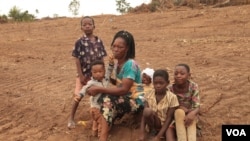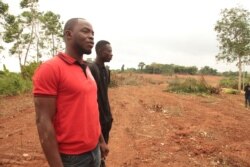Ghana, famous for its cocoa, supplies about 20 percent of the world's market. This year, the government announced plans to raise cocoa incomes, but cocoa bean farms are being destroyed, with or without the farmers' consent, as landlords end their leases early in favor of other crops, development or mining.
Farmer Ama Serwah supported her children and grandchildren by growing cocoa and other crops on leased land. This month, a bulldozer cleared the land, as well as the livelihood of Serwah's family. Farmers believe the land was cleared to make way for a cattle farm.
In Asikesu, a cocoa-growing region of Ghana, hectares of cocoa trees like Serwah's have been destroyed. Farmers like Serwah have toiled for years growing their crops, on land they do not own or have much control over.
Serwah says the compensation she received was not enough and now she does not know how she will feed her family.
Another farmer, David Servor, also surveys land he once farmed, using the profits to help pay his children's school fees. Now, he has been told to leave his home.
"About two weeks now I have not had sleep," he said. "Thinking, thinking, thinking, because all what I have done in my lifetime has gone forever. And it's like I'm alive but I'm dead."
Ghana's cocoa industry is regulated by a government body that sets the price the growers earn from their beans.
Earlier this year, Ghana added a $400 "living income differential" fee per ton of cocoa beans sold on the market, with the aim of improving livelihoods for farmers.
The president of the Concerned Farmers Association, Nana Oboadie Opambour Boateng Bonsu, says ensuring a sustainable future for Ghana's cocoa farmers means protecting the crop on which they rely.
"This is a serious challenge and it's something that we have been fighting for for so long, but it seems the government has put wax in its ears because government is not all that serious about this cocoa issue," Bonsu said.
Farmers losing their land is a major problem, Ghana's cocoa regulator says, and often the ownership structure of land is the issue, where farmers lease land from chiefs who later take it back when enticed by other developments.
While the regulatory agency works with chiefs to combat the practice, it does not have the right to tell landowners what to do with their property. However, officials say it offers legal representation to farmers to address compensation rates.







